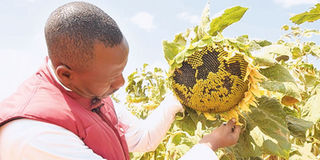Future bright for sunflower producers

A farmer inspects sunflowers at his farm. Cultivation of the crop is expected to rise following a trade contract between Tanzania and the European Union. PHOTO | FILE
What you need to know:
- A commendable stride has so far been made as the government strives to revive the sunflower sub-sector.
Dar es Salaam. Tanzania is on an ambitious mission of becoming an industrial economy by 2025 and edible oil production is among the key areas that need a fresh impetus.
A commendable stride has so far been made as the government strives to revive the sunflower sub-sector.
The government plans to maximise the production of sunflower oil through adoption of modern techniques to meet both national and international demands.
With this in mind, the government and the European Union (EU) recently signed a Trade Facility contract, which is worth Sh36.5 billion.
The multibillion deal is expected to bolster processing and value addition of agricultural products as well as minerals.
Agro-processing is regarded as one of the strategic sectors for industrialisation.
The European Union and the EAC, head of delegation Ambassador, Roeland van de Geer told The Citizen in a recent interview that they signed the contract with a view to increasing domestic production of sunflower oil in order to reduce imports.
The Sector Development Strategy 2016-2020 that was developed by the Ministry of Industry, Trade and Investment aims at increasing production and supply of good quality sunflower seed, which would guarantee increased oil production.
“Challenges remain in ensuring adequate supplies of good quality seeds for the cluster and ensuring that processing and handling comply with standards and food safety requirements among the processors,” he said.
“These are important and must be addressed to ensure that the products are acceptable and safe for consumption,” he said.
According to him, the programme intends to provide the necessary capacity building activities for several players and support institutions along the value chain so that they help in processing according to the required standards, ensure safety and that products are offered to the national and international markets.
He said following the signing of the contract, funds would be released upon completion of the on-going requisite administrative steps.
“The tentative date is estimated in the last quarter of 2017. The exact starting date will depend on the finalisation of the on-going administrative procedures. Funds could be released before the end of the year,” he said.
He said, as per usual procedures, the country would receive an advance payment on the programme’s overall budget and further payments will be released on the basis of results achieved as indicated in the performance assessment framework agreed between Tanzania and SADC.
The programme requires finalisation of a set of administrative procedures before starting its implementation.
Upon commencement of the programme, which is relevant to the national context and in line with most recent strategy launched in 2016, the planned actions will support the country to increase production, add value, reduce imports and diversify sunflower export markets.
For his part, ministry of Industry, Trade and Investment, director of industrial development, Mr Obadiah Nyagiro said the government’s strategy seeks to increase of the production of sunflower through the adoption of techniques.
He said the government’s goal is to help increase the availability and accessibility of certified sunflower seeds and improve their availability and distribution plus ease access to fertilizers and pesticides.
Mr Nyagiro added that the strategy also aims at strengthening and facilitating the development of small, medium and large-scale agribusiness services, increase the capacity of farmers and their associations to produce quality sunflower seeds and grains as well as improve access to finance and insurance along the value chain and encourage modernisation of technologies in the sector.
“Another objective is to modernise the sunflower industry through strengthening the coordination, institutional capacity and skills across the value chain,” he said. He noted that they need to improve transparency and trust across the value chain, particularly through the development of a code of conduct on best practices, promote contract farming in the local sunflower industry and strengthen coordination across the sunflower industry.
He further said that they target strengthening the capacity of key organisations in the sector by promoting the use of locally produced sunflower products, provide training to improve business management skills across the sunflower value chain and improve the quality as well as increase the availability of storage facilities at both the village and district levels.
Mr Nyagiro said they also plan to implement price differentials based on quality, ensure compliance and adherence to internationally recognised food safety and quality measures, particularly, through the harmonisation of standards and enhanced enforcement capacity and further promote the development of organic sunflower production to respond to the market demand.
Recently, the Tanzania Private Sector Foundation (TPSF) released a report titled ‘Consultancy Services for the Fiscal Policy Study on Edible Oil Sector in Tanzania’ of 2017, which outlines a number of reasons behind the contradictory situation of edible oil sub-sector like poor seed quality and low accessibility of the same to the farmers.
It revealed that the country’s edible oil imports and exports have been growing positively for the past five years. Import values grew from Sh293 billion in 2010 to Sh655 billion in 2016 and export values grew from Sh77 billion in 2010 to Sh910 billion in 2016.
TPSF director of Policy Advocacy Research and Lobbying Mr Gili Teri said Tanzania has 75 per cent overcapacity of edible oil processing for small scale and 40 per cent of processing capacity for large processors.
He said currently, the country’s edible oil market demand is estimated to be 500,000MT and local edible oil production can only meet 39 per cent of the total demand.
The bulk of sunflower seed produced is used to make sunflower oil, with only 5 per cent of the crop consumed as seeds in bakery, snacks and bird feed.
The crop was first commercially produced in Russia and today the largest producers are Russia (25 per cent), Ukraine (22 per cent) and the EU (22 per cent).
African countries account for 5.5 per cent of the world’s production with a strong growth experienced in the past decade.
Sunflower oil imports have had the fastest growth over the last decade, compared with competing edible oils. The growth in demand for sunflower oil can be attributed to the growing consumer awareness and interest in its healthy profile in comparison to other oils and fats.
The EU is an important market, as a major producer and importer of both seeds and oil, as well as the exporter of oil and processed products.
It is also the largest market for sunflower oilseed cake, accounting for 25 per cent of world production and 45 per cent of demand for the world production in 2013.
Tanzania has a large, national demand for edible oil.
The Rural Livelihood Development Company estimated a minimum national demand of around 330,000 tons of edible oil per annum in 2010, a figure that was expected to increase as consumption rose by 3 per cent annually.
Currently more than half of the edible oil consumed is imported. Current data shows that local production of both factory and small-scale extracted oils contributes to about 40 percent of the national edible oil requirement.
Despite the world market for sunflower products experiencing extraordinary growth of 15 per cent over the last decade, Tanzania managed to outperform the world market by reaching 50 percent average annual growth, albeit from a low base.
During the past decade, Tanzania’s market share in world trade rose from 0.04 per cent in 2005 to 0.24 per cent in 2010, and 0.49 per cent by 2014.



